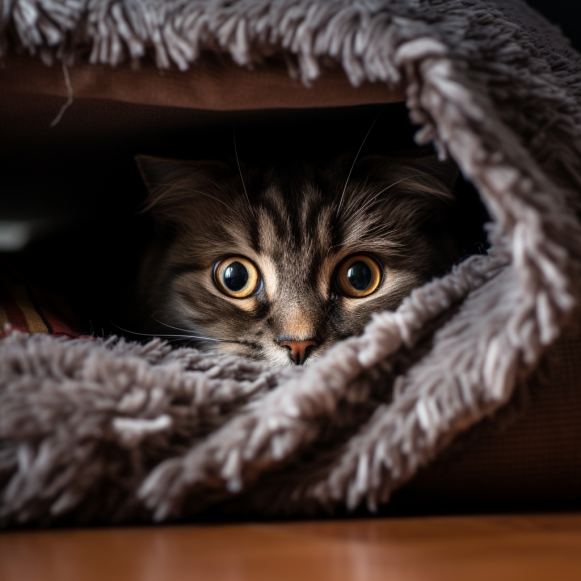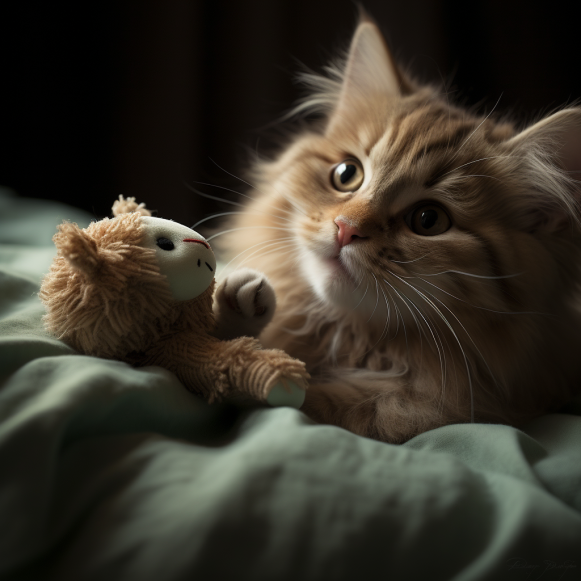Cat anxiety: how to help a stressed cat
It's never pleasant when your cat is stressed or anxious, but it's important to know the signs and what to do if your cat is suffering from stress or anxiety.
In this article, we’ll closely examine cat anxiety symptoms, the causes of stress and anxiety and how to keep your cat as happy and calm as possible.
What are stress and anxiety in cats?
Anxiety and stress are caused by anything which makes cats feel worried or scared, even when there is no real danger. They can happen for a variety of reasons, including changes to routine and new situations. Anxiety can affect cats in different ways, and can change over time.
What’s the difference between stress and anxiety?
Stress and anxiety are both normal responses to real or imagined threats or danger. However, there are some key differences between the two.
Stress is a short-term response designed to help your cat prepare to fight or flee. It doesn’t last long and can generally be reduced by removing whatever’s stressing your cat out.
Anxiety is a longer-term response to a perceived threat. This threat could be real, like another cat in the house or imagined like you leaving and not coming back.
Why do cats suffer from stress?
Cats, like people, are more equipped to deal with short-term stress. Short-term stress can include being chased over a fence by a dog or hearing the hoover come close to their resting spot. Your cat will respond by releasing adrenaline, and instinctively move away or defend themselves from this threat.
However, long-term stressors can be more difficult, because they can’t use their fight or flight technique, i.e. run away over the fence or fight the dog. These chronic stressors could be a new puppy, baby or cat in the house, a constantly dirty litter tray, or nowhere for them to relax and sleep uninterrupted.
This long-term, or chronic, stress can lead to behavioural problems and health issues that can take a long time to fix. Sometimes, the cat can suffer from such extreme anxiety in certain situations that the only solution is to consider rehoming them.
What are the causes of cat anxiety?
Anxious cats may feel fear, worry, and apprehension. These emotions can be triggered by both internal and external factors.
Internal factors that can contribute to anxiety
Genetics
Some cats are simply more prone to anxiety than others.
Medical conditions
Certain medical conditions, such as hyperthyroidism and cognitive dysfunction, can also cause anxiety in cats.
External factors that can trigger anxiety
Early experiences
Cats that have had negative experiences in their early life, such as abuse or neglect, are more likely to develop anxiety later in life. A lack of early socialisation can also affect future relationships with people or other pets.
Environmental changes
Cats are creatures of habit and can become stressed by any major changes to their home environment. This could be moving to a new home, having new furniture or people in the house, or even just changing their daily routine. Even small details, such as where their litter tray is, or the position of their food and water bowls, can be a source of stress for cats.
Strained human-cat relationship
Tensions between human and cat members of the household can be stressful for everyone involved. Poor early socialisation, difficult experiences in kittenhood and misunderstandings of normal cat behaviour can all affect the bond between cat and owner. Understanding cat behaviour and proper cat ownership can positively impact this type of stressor.
Cat separation anxiety
Cats, like dogs, can suffer from separation anxiety. Cat separation anxiety is when they get anxious when they are left alone. This can create a range of behavioural issues, including excessive meowing, destructive behaviour, or peeing or pooping outside of the litter box.
Other animals
Cats are naturally territorial and can become anxious if they feel threatened by other animals in the house, like dogs or other cats. This is especially true if the cat has not been well socialised with other animals, and is often especially apparent if a new puppy or kitten is brought into the home.
Loud noises
Cats are very sensitive to sound and can become anxious if they are exposed to loud noises, such as fireworks, thunderstorms, or renovation work. If you need to do work on your home, consider setting aside a safe room as far away from the work as possible and set them up there with food, water and their litter tray.
Pain or illness
Cats can be in pain or get ill just like people, and this can lead to anxiety and stress. If you notice any changes in your cat's behaviour, such as hiding, decreased appetite, or lethargy, it is important to take them to the vet to rule out any medical problems.
Cleanliness
Cats are clean animals and can get stressed when their environment isn’t up to scratch. This is especially true when it comes to their litter tray. A dirty litter tray can lead to your cat peeing somewhere else in your house or refusing to pee altogether. This can have serious complications for their health, leading to even more stress.
Signs of a stressed cat
Anxiety in cats can be difficult to diagnose because many of the symptoms are subtle and can also be caused by other medical conditions. If you are concerned that your cat may be stressed, it is important to talk to your vet. They can rule out any underlying medical problems and help you develop a plan to reduce your cat's stress levels.
Certain symptoms are more obvious signs of stress. Excessive grooming is a common way for cats to cope with stress and can lead to bald patches on the cat's fur, especially around the tail, flanks, and abdomen. Stressed cats may show behavioural changes, such as hiding away more or aggressive behaviours.

Some signs of stress, such as urinating outside the litterbox, or poor coat condition, can also be caused by health conditions. It’s important to take your cat for a check up if their health or behaviour alters. Chronic stress can predispose to poor health, so it’s important to tackle any issues.
Cat anxiety symptoms can include:
- Excessive grooming and hair loss
- A change in appetite
- Reluctance to play
- Spraying urine or urinating in unusual places
- Hiding
- Aggressive behaviours
- Vocalisation
How do vets diagnose anxiety in cats?
Vets will diagnose your cat’s anxiety by talking to you about your cat’s behaviour. They will be looking for changes in behaviour, such as hiding, avoiding people or other animals, destructive behaviours, or vocalising excessively. They may also look for changes in appetite or sleep patterns and a history of stressful events or experiences.
They’ll also rule out underlying health problems by performing a physical exam and may suggest further investigation such as blood tests and urine analysis.
Once they have ruled out any medical conditions, they can develop a treatment plan for your cat's anxiety. Treatment may include environmental changes, behavioural modification, or medication.
It is important to note that anxiety can be difficult to manage, and it may take some time to find the best treatment plan for individual cats.
How do I help my stressed or anxious cat?
There are lots of ways in which you can lower your cat's stress levels.
Identify the source of the stress
Once you know what’s causing your cat's stress, you can start trying to reduce it. For example, if loud noises stress your cat, you can try to block out the noise or provide your cat with a safe place to hide.
Provide your cat with a safe and comfortable environment
Ensure your anxious cat has access to plenty of places to hide, climb, and scratch. You should also ensure that your cat has access to food, water, and a litter box in a quiet location. In fact, you should always have one more litter box than you do cats. This gives them a choice and prevents one cat from blocking access.
Avoid making sudden changes to your cat's routine. If you need to change something in the house, try to do it gradually.
Spend time with your cat and play with them regularly
Playing will help to strengthen the bond between you and your cat and make them feel more secure. It will also help keep them stimulated, which is key to keeping your cat happy and healthy.

Use pheromone diffusers or sprays
Pheromones are man-made copies of the natural chemicals that cats produce to communicate with each other. Pheromone diffusers and sprays can help to calm and relax cats.
Talk to your vet
If your cat's stress is severe or does not improve with home remedies, your vet may prescribe medication or other treatments. Your vet will also be able to discuss referral to a specialist behaviourist if necessary.
Keep calm and carry on
Be patient and understanding. It may take time for your cat to learn to cope with stress. Don't punish your cat for how they react to stress. This will only make them more stressed and make it more difficult for you and them to change their behaviour.
It is important to remember that every cat is different, and what works for one anxious cat may not work for another. It is important to be patient and try different things to find what works best for your cat.
What have the studies found?
Interestingly, there have been a number of studies on anxiety in cats that can help owners reduce the risks and understand possible complications from cat stress.
The Secure Base Effect
Cats can use their owner's presence to feel safe and calm in new or scary situations. This is called the Secure Base Effect (SBE). Researchers wanted to see if a cat's owner's scent could also have the same effect.
They tested 42 adult cats in an unfamiliar room with and without their owner present and with and without a scented object from their owner present. The results showed that the cats were less stressed when their owner was there but not when they just smelled their owner's scent.
This means that owner scent can help to reduce anxiety in new situations, but it's not enough to give cats the full benefits of SBE. Researchers think this is because the SBE requires more than just the presence of the owner's scent. It also requires the cat to have a close bond with their owner.
The findings of this study could help cat owners to manage their cats' anxiety in new situations. For example, owners could give their cats a toy or blanket that smells like them when they leave them in a cattery or overnight vet stay.
Stress and your cat's lower urinary tract
Cats can have lots of problems with their lower urinary tract, commonly grouped together as feline lower urinary tract disease (FLUTD). Symptoms include:
- Needing to pee more or less often
- Peeing less when they do go
- Straining to pee
- Having blood in their pee
- Peeing outside their litter box
There are lots of possible reasons for these issues, but the most common are:
- Idiopathic cystitis (cystitis without a known cause)
- Stones in the bladder or urethra
- Urinary tract infection (UTI) (usually in older cats with upper tract disease)
However, a study also found that stress can also impact the lower urinary tract. Much research has been done on this topic, and it is well-accepted that there are strong links in cats between stress and urinary disease.

Need more info?
For more advice on anxiety or any other aspect of your cat's welfare, get in touch with your local vet.
Find your nearest vet using our Find a Vet page, or speak to a vet online using Online Vets.


